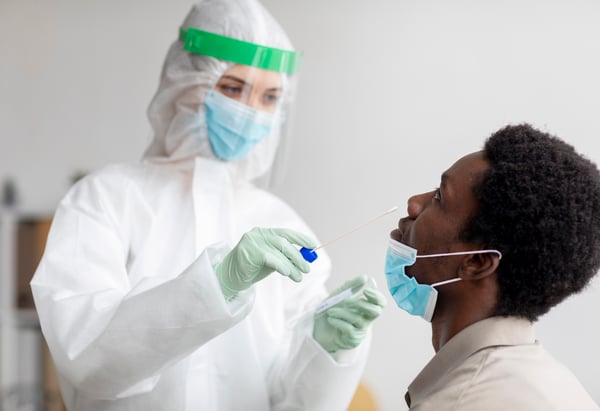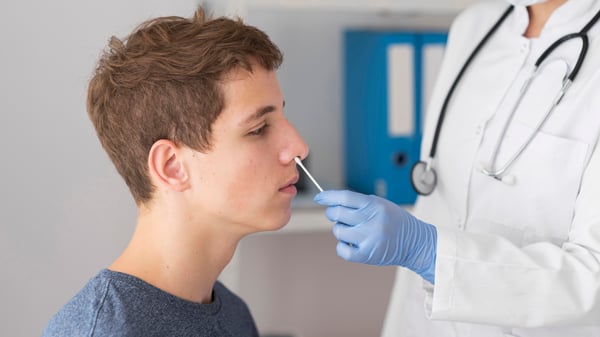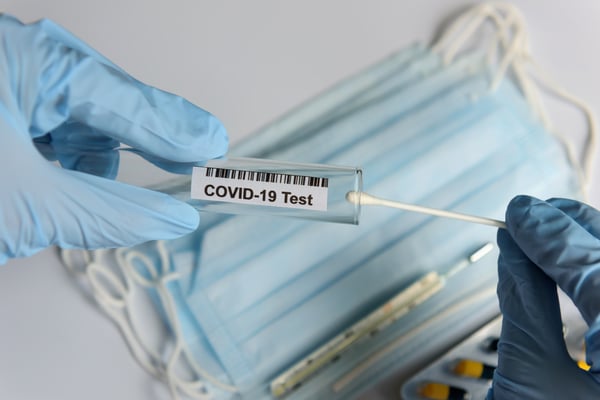COVID-19 testing in the workplace can help provide confidence and clarity to an entire workforce that all steps are being taken to minimise the spread of the Coronavirus. For employers, it is an essential step in properly mitigating risk when staff return to the office.
Whether you use virus testing or antibody testing, testing procedures, coupled with other COVID-19 precautions, will help create the best environment for your staff. In this blog we explore the different types of testing you can use and how you can implement this across your business.

Types of COVID-19 testing
As an employer, there are two types of testing that you can deploy to monitor your workforce. These are:
- Virus testing
- Antibody testing
Each type of testing has its own benefits and allows you to manage, analyse and mitigate risk throughout your workplace.
Virus Testing
A virus test will identify whether a member of staff has COVID-19 at that moment. This gives you a live understanding as to what employees are and are not contagious.
Virus tests work by collecting saliva from the nose and/or your mouth. This saliva is then used to test for SARS-CoV-2, the virus that causes COVID-19. Two types of viral tests can be used:
1) Nucleic acid amplification tests (NAATs): These detect the virus’s genetic material and are commonly used in laboratories. NAATs are generally more accurate, but sometimes take longer to process than other test types.
2) Antigen tests: These detect viral proteins and are generally not as sensitive as NAATs, particularly if the antigen test is used on someone without COVID-19 symptoms. If you have a positive or negative antigen test, your healthcare provider may need to confirm the test result with a NAAT.
Any member of staff that test positive for the SARS-CoV-2, has a legal duty to self-isolate. This was introduced by the government to stop the spread of the virus. This means that they will no longer be able to physically work on the premises until the isolation period has ended.
Antibody testing
An antibody test looks for the presence of antibodies against the COVID-19 virus. Antibodies are produced by some of the people that have had the virus and recovered. If an antibody is present, the employee will have a higher chance of having immunity from the virus moving forward.
Unfortunately, although their chance is higher, there is currently no conclusive evidence to suggest that those who have antibodies have developed complete immunity from the virus. This means they have a chance of catching it again.
Antibody tests do, however, help answer the question of what employees have had the virus or not. This information can be essential in understanding how likely the virus will spread in your workplace. Through understanding this, you can create a unique response for testing and other COVID-19 practices when returning your workforce to the office.

Why is COVID-19 testing important?
COVID-19 testing is important for employers as it allows them to understand what is happening within their workforce and create plans and procedures to mitigate the risk of the virus spreading.
Virus testing
Virus testing is likely to be the most relevant and important form of testing for employers when looking to return their staff to the workplace. Virus testing can be so important as it allows you to identify and isolate contagious employees. By removing infectious people, you can stop the spread of the virus to other members in your office.
Antibody testing
Antibody testing, although not as immediately effective as virus testing, allows a workplace to see trends and patterns through data collected throughout the workforce. This is beneficial as an employer can create a tailored response when returning their workforce to the office.
As well as creating a unique virus testing process, you can implement other COVID-19 practices in line with your testing policy to ensure that as much risk has been mitigated by the employer as possible.
Creating a safe environment
Both types of testing are so important in helping create a safe environment for your employees to return to. Since the outbreak of the virus, the employee’s health and wellbeing has been the most important aspect to consider when returning safely to the office.
It is important to consider the physical health of your workforce. Testing can help keep them safe by eliminating the risk of the virus spreading. It will also improve the mental wellbeing of your staff as they can feel safe knowing you are taking active steps to create a safe space.

Implementing testing throughout your workplace
Implementing COVID-19 testing throughout your workplace will help control the risk of the Coronavirus spreading. Below are the things you should consider as an employer:
Setting common testing standards
Before rolling out any testing in your workplace, it is vital that you set common testing standards and procedures across your business. You can not be seen to be favouring or giving preferential treat to certain staff members.
By setting common standards, you eliminate the possibility of discrepancies across your workforce. Implementing these standards from top to bottom allows all staff members to know exactly where they stand when returning to the office.
Communicating your intentions to staff
Once you have determined your testing standards, this includes both the virus testing and antibody testing, you must communicate this to your workforce. This can be done through bulk communications or on an individual basis.
By communicating your intentions officially to your staff, you are removing the possibility of any confusion or problems once the testing has begun. If a member of staff disagrees with what is happening, you can also resolve any issues in a calm and non-disruptive way.
Some important points to communicate include:
- Why you are setting up a testing programme.
- Whether the programme is voluntary or mandatory.
- What the consequences are for staff who decline to take part in the testing programme.
- What will happen if you test positive during the programme.
Selecting and procuring test kits
As an employer, it is recommended hiring a third-party healthcare provider to carry out your tests to procure your test kits. By employing an official healthcare provider, you can ensure that all tests selected meet government regulations.
Test kits in the UK are regulated by the MHRA, which is responsible for administering and enforcing the law on medical devices in the UK. An official healthcare provider will be aware of the test requirements as well as having easy procurement access to suppliers.
Distributing test results
Once a test has been completed it is your legal obligation, as an employer, to distribute the results to the employee. Transparency is by far the best option.
Once you have delivered the results you can detail the actions needed to be taken by the employee to help reduce the spread of the Coronavirus.

If you need any more guidance around COVID-19 testing in the workplace you can visit the UK governments official guidance page to help employers.
